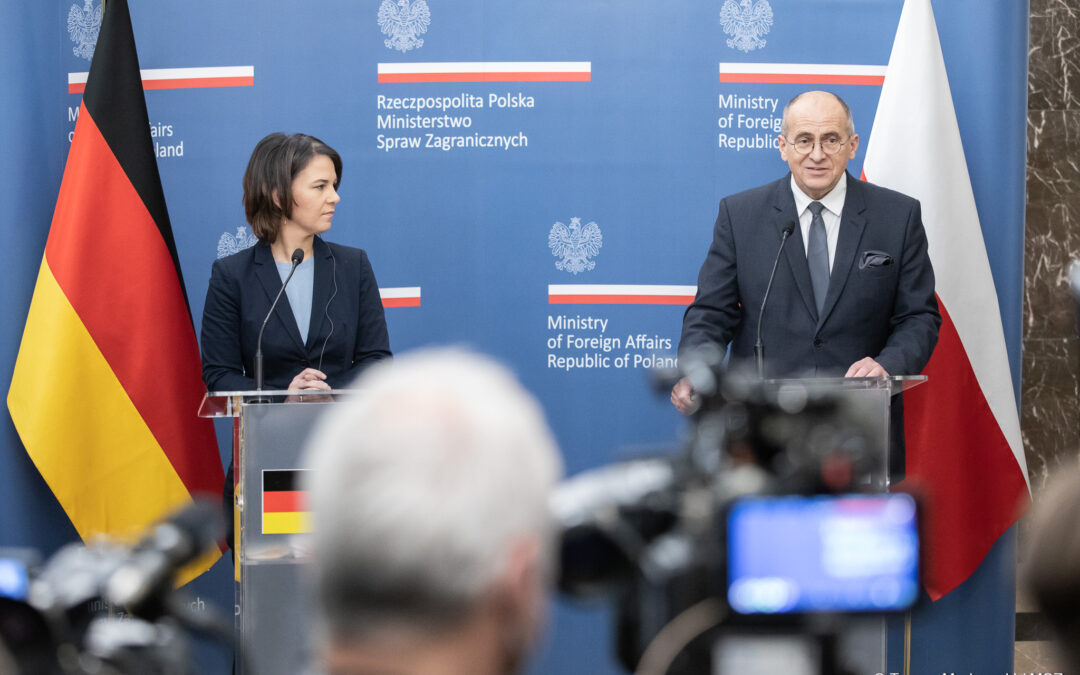The foreign minister in Germany’s new government, Annalena Baerbock, today visited Warsaw in the third leg of her first official trip abroad, which previously saw her travel to Paris and Brussels.
During her stay, Baerbock and her Polish counterpart, Zbigniew Rau, emphasised the importance of relations between the two neighbours. But they also acknowledged significant points of difference, with Rau repeating Poland’s calls for war reparations and demanding that Germany shut down the Russian Nord Stream gas pipelines.
Min. @RauZbigniew spotkał się dziś z nową min. SZ 🇩🇪 @ABaerbock.
Ministrowie omówili m. in.:
🔹upamiętnienie w Berlinie 🇵🇱 ofiar II wojny światowej,
🔹bezpieczeństwo energetyczne,
🔹sytuację na granicy,
🔹współpracę w ramach Trójkąta Weimarskiego. pic.twitter.com/f0P5Kni3Wg— Ministerstwo Spraw Zagranicznych RP 🇵🇱 (@MSZ_RP) December 10, 2021
War guilt
“We talked about many topics on which we agree, but also about matters that divide us,” said Baerbock, co-leader of the Greens, who entered government this week in coalition with the Social Democrats (SPD) and Free Democratic Party (FDP), ending 16 years of rule by Angela Merkel and her Christian Democratic Union (CDU).
“Polish-German friendship is something priceless, but also not obvious, especially given the suffering of Poles at the hands of Germany during the war,” she added, quoted by TVP. “The coalition agreement refers to German guilt, responsibility and obligations. It is our historic task to cultivate peace and friendship.”
Rau thanked Baerbock for visiting Warsaw immediately after Paris and Brussels. While acknowledging the strength of relations, he also referred to the legacy of the war, noting that “many issues have not been resolved to reflect the public’s sense of justice”.
Poland “expects the new German government to be ready to face this responsibility, including in the form of compensation and redress,” said Rau, quoted by Interia. Warsaw has recently renewed its push for war reparations from Berlin, which the previous German administration rejected as having no legal basis.
Rule of law
Ahead of her visit, Baerbock had emphasised that an integral part of her discussions with partners would be the EU’s “fundamental values and rules”. She warned that, “particularly in the case of the rule of law and human rights, we cannot allow Europe’s foundations to be eroded”.
Before joining government, Baerbock had, as leader of the Greens, criticised the Polish government’s judicial reforms and called on the European Commission to “take firm and swift action to preserve the independence of Poland’s judiciary”.
When asked about the rule of law following her meeting with Rau today, Baerbock said only that they had discussed “difficult topics” and that “we, as Germans, do not want to give advice”. Instead, she hoped for “common European solutions that will strengthen” the rule of law, reports Euractiv.
Threats from the East
Rau, meanwhile, used the opportunity to push the new German coalition to take firmer action against Moscow. He argued that “previous German governments contributed to the increase in the threat to peace in Europe” by their “policy of cooperation with Russia” in construction of the Nord Stream pipelines.
“Poland will constantly demand the closure of this project [Nord Stream], which is harmful to Europe,” said Rau, quoted by TVN24. “And our policy will not change on this matter.”
Baerbock meanwhile, expressed her government’s “full solidarity” with Poland and the Baltic states “in the face of President Lukashenko’s blackmail” – a reference to the migration crisis on the EU’s eastern border, which has been orchestrated by Belarus.
But she also called for humanitarian aid to be given to the thousands of people – mainly from the Middle East – trying to cross the border. “This is our common European border, where humanity and order apply,” she said, quoted by Deutsche Welle.
The new German interior minister wants EU border agency Frontex to be present at the Polish-Belarus border – an idea Poland has rejected – to ensure "legal standards are respected".
She also wants access for aid organisations, which are currently banned https://t.co/Slo9XiAuGd
— Notes from Poland 🇵🇱 (@notesfrompoland) December 10, 2021
The future of the EU
Recent weeks have seen a number of senior Polish officials raise concern at what they claims are plans by Germany to turn the EU into a “superstate”. Some – reportedly including ruling party chairman Jarosław Kaczyński – referred to this as a “Fourth Reich”.
Last week, Kaczyński invited other European right-wing and far-right leaders – including Marine Le Pen and Viktor Orbán – to a summit in Warsaw to discuss their vision for the future of the EU as a union of “free and equal nation states”.
Speaking alongside his German counterpart today, Rau emphasised that the Polish government is opposed to the idea of a more federal Europe.
During the previous legs of her current tour, Baerbock had emphasised that her government “favours a strong EU”, reports Deutsche Welle. But she assured that “we will not implement our visions and interests over the heads of our neighbours, and certainly not at their expense”.
The new German chancellor, Olaf Scholz of the SPD, is due to arrive in Warsaw on Sunday, where he will meet with Prime Minister Mateusz Morawiecki.
Main image credit: Tymon Markowski/MSZ (under CC BY-NC 2.0)

Daniel Tilles is editor-in-chief of Notes from Poland. He has written on Polish affairs for a wide range of publications, including Foreign Policy, POLITICO Europe, EUobserver and Dziennik Gazeta Prawna.




















